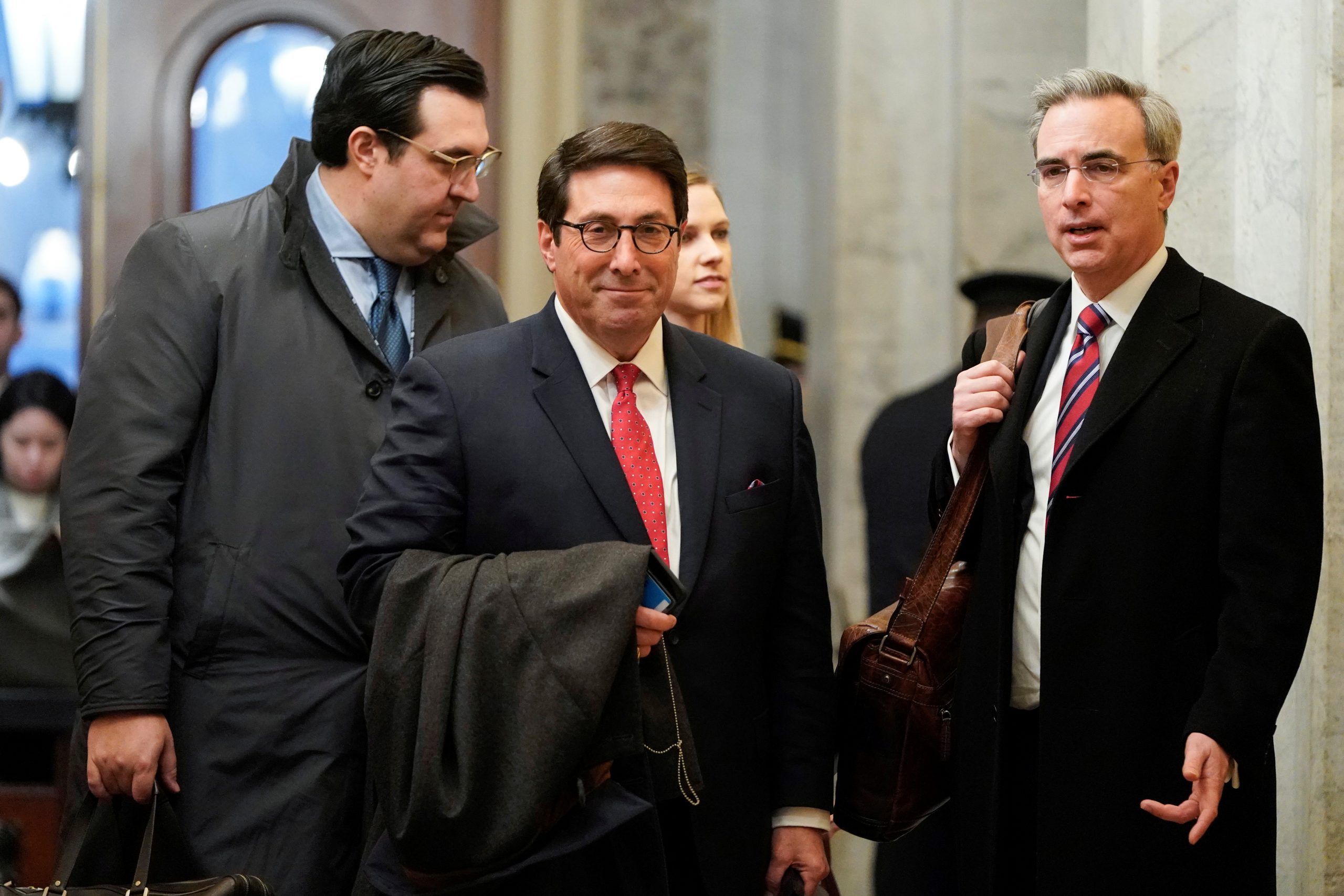Just before his lawyers stepped into the U.S. Senate to begin their argument that he should not be removed from office, President Donald Trump offered a preview of sorts.
Americans should turn on their televisions, he wrote on Twitter, and watch the attorneys make “our case against” his political antagonists, who he listed with a series of taunting nicknames.
What those who tuned in saw was something quite different.
When Trump’s legal team launched his defense at his impeachment trial on Saturday, they outlined a case far removed from his all-caps claims of a perfect phone call with his Ukrainian counterpart and denunciations of his political foes.
Instead they focused largely on what they cast as glaring holes in Democrats’ argument that Trump should be removed from office for his efforts to secure politically beneficial investigations from Ukraine’s government, and argued that the allegations against Trump did not justify ousting him in an election year.
“We don’t believe they have come anywhere close to meeting their burden for what they’re asking you to do,” White House counsel Pat Cipollone, the head of Trump’s defense attorneys, told lawmakers on Saturday.
The defense his team outlined was more subdued and sober than what Trump’s lawyers, his political allies and certainly he himself has presented in the past. Whether that will continue when the trial resumes on Monday is anyone’s guess, but their tone and engagement with the merits of the case that the Democrats have tried to build did not go unnoticed by some of the lawmakers who will decide whether Trump remains in office.
Democratic Senator Tom Carper of Delaware told reporters he “came expecting that the Republicans would come out all guns blazing and fire and brimstone, and I think they got a message from some of their Republican brethren that that would not be helpful.”
He said he thought the presentation was aimed at a handful of moderate Republican senators who could break with their party and vote to let Democrats summon some of Trump’s closest aides to testify for the first time about the president’s conduct.
‘LOW-KEY, SPECIFIC’ AND ‘SOLEMN’
Trump has at times issued a much higher-decibel defense, declaring on Twitter that he “GOT IMPEACHED FOR MAKING A PERFECT PHONE CALL” and urging people to “READ THE TRANSCRIPTS.”
Trump’s lawyers still struck some of his favorite notes, accusing Democrats pressing for his removal of trying to “cancel an election,” casting him as the victim of a succession of politically motivated investigations brought only to tarnish his presidency, and seeking to discredit Representative Adam Schiff, the lawmaker leading the impeachment effort. Cipollone said on Saturday that Democrats were “here to perpetrate the most massive interference in an election in American history.”
Senator Lamar Alexander, a Republican, said Trump’s lawyers “were low-key, specific and I thought they were persuasive.” Republican Senator Shelley Moore Capito said “it was pretty solemn, too, which I appreciated.”
The Democratic-led House of Representatives impeached Trump in December on two charges, abuse of power for pressuring Ukraine to investigate former Vice President Joe Biden, a leading contender to challenge Trump this year, and obstruction of Congress for his efforts to impede the House investigation. The charges center on claims by administration officials that Trump pressed for the investigations using nearly $400 million in security aid and a coveted White House visit as leverage.
The Democratic lawmakers serving as prosecutors in the trial spent three days last week mapping the case against Trump, drawing on documents and testimony from administration officials about Trump’s efforts to secure investigations into the Bidens and a discredited conspiracy theory about the 2016 election.
Trump’s lawyers sought to chip away at that evidence on Saturday, pointing out that most of the witnesses who testified that Trump tried to trade government acts for political benefits never interacted with him directly. They also highlighted statements from Ukrainian officials who said they did not feel under any pressure.
And they sought to poke holes in some of the more powerful evidence against Trump, including testimony from the ambassador to the European Union, Gordon Sondland, who said he supposed that a holdup in security aid was connected to Trump’s desire for investigations. Sondland also testified that he never saw the president draw that link directly. “The ambassador’s mistaken belief does not become proof because he repeated it many times,” Trump lawyer Mike Purpura said.
Ultimately, the presentations by Trump’s lawyers and the Democratic prosecutors might not matter much given the numbers in the Senate: Trump’s fellow Republicans hold a 53-47 majority and Democrats would need at least 67 votes to convict him.
(Reporting by Brad Heath, Richard Cowan, Makini Brice and David Morgan; Editing by Mary Milliken and Daniel Wallis)

























 Continue with Google
Continue with Google